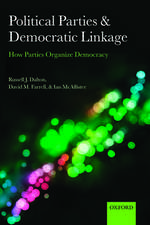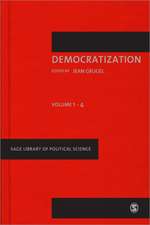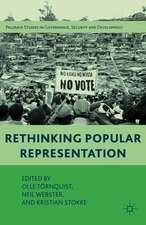Institutionalizing Agonistic Democracy: Post-Foundationalism and Political Liberalism: Rethinking Political and International Theory
Autor Ed Wingenbachen Limba Engleză Hardback – 21 sep 2011
Preț: 1004.20 lei
Preț vechi: 1224.64 lei
-18% Nou
Puncte Express: 1506
Preț estimativ în valută:
192.15€ • 201.16$ • 158.99£
192.15€ • 201.16$ • 158.99£
Carte tipărită la comandă
Livrare economică 07-21 aprilie
Preluare comenzi: 021 569.72.76
Specificații
ISBN-13: 9781409403531
ISBN-10: 140940353X
Pagini: 238
Dimensiuni: 156 x 234 x 14 mm
Greutate: 0.57 kg
Ediția:1
Editura: Taylor & Francis
Colecția Routledge
Seria Rethinking Political and International Theory
Locul publicării:Oxford, United Kingdom
ISBN-10: 140940353X
Pagini: 238
Dimensiuni: 156 x 234 x 14 mm
Greutate: 0.57 kg
Ediția:1
Editura: Taylor & Francis
Colecția Routledge
Seria Rethinking Political and International Theory
Locul publicării:Oxford, United Kingdom
Notă biografică
Ed Wingenbach is Interim Associate Vice-President of Academic Affairs at the University of Redlands, USA. His research interests include contemporary political theory, democratic theory, Heidegger, and the scholarship of teaching and learning. He has published articles and chapters on a range of topics in some of the top journals in his fields, including the American Journal of Political Science, the Journal of Politics, and International Philosophical Quarterly. He has received repeated recognition for excellence in his teaching, including awards at Notre Dame and the University of South Carolina, and a nomination for Professor of the Year at the University of Redlands. In 2006 he received the University of Redlands Award for Outstanding Service.
Recenzii
'Overall, Wingenbach's work is a passionate and thoughtful defense of agonistic democracy and its need to be institutionalized. Against those who claim that agonistic thought provides little foundation for positive political formulations, Wingenbach carefully and with great skill develops an agonistic liberalism that is faithful to agonistic philosophy and political liberalism. The first half of the work provides an accessible and rich analysis of the various strands of agonistic thought. Then, Wingenbach develops an innovative and compelling version of agonistic liberalism that will appeal to those seeking to develop a post-foundational political thought on the principles of agonistic philosophy or its close relatives, postmodernism and postcolonialism. In so doing, Wingenbach offers a clear and convincing response to those critics of agonism who claim that its Achilles heel is that it provides little or no guidance for creating political institutions.' William Paul Simmons, Arizona State University, USA 'Wingenbach reads agonistic democracy soberly and pragmatically; he reads Rawls radically. This leads him to the counterintuitive yet pathbreaking conclusion that only political liberalism can provide safe harbor for the principles and ethos of agonistic democracy. This book may please neither Rawlsians nor radical democrats, yet it will show both that the future of democracy lies in the formation of democratic institutions that foster agonism.' Samuel A. Chambers, Johns Hopkins University, USA 'Wingenbach artfully develops the institutional framework of agonistic pluralism. Given the agonistic commitment to exposing and contesting the inevitable violence, exclusions and remainders of forms of political order, this is no easy task. Closely engaged with a broad range of contemporary democratic theory, this book brings agonistic and post-structuralist theory "into the fold" of liberal theory and political science research on institutions, offering a time
Cuprins
Preface; Introduction; Part I Post-Foundationalism and Agonistic Democratic Theory; Chapter 1 Post-Foundational Politics and Democracy; Chapter 2 Agonism and Democracy; Chapter 3 A Typology of Agonistic Democracy; Chapter 4 Agonistic Democracy and the Question of Institutions; Part II Evaluating the Institutional Possibilities for Agonistic Democracy; Chapter 5 Agonistic Democracy and the Limits of Popular Part icipation; Chapter 6 Populism, Representation, and the Popular Will; Chapter 7 Political Liberalism, Contingency, and Agonistic Pluralism; Chapter 8 Liberalism, Agonism, and Democracy;
Descriere
Contemporary politics are characterised by the impossibility of agreement on fundamental values. This book examines the institutional alternatives available to democratic politics to determine which institutional structures are most likely to produce a democratic social order in which agonistic citizenship might flourish.





























